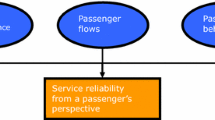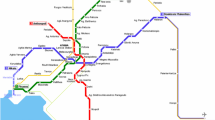Abstract
Transit operations control, the task of implementing the operations plan in daily operations on a metro line, plays a key role in service delivery because it determines the quality of the service experienced by passengers. Yet, it is one of the most poorly understood aspects of rail transit operations. Faced with a disruption or infeasibility, dispatchers typically choose between several response strategies. However, to date, it has been very difficult to evaluate the positive and negative effects of individual control strategies with respect to operations and passenger travel times under real-world conditions. This paper proposes a framework for the study of rail operations control decisions that integrates automatically collected service and passenger demand data, which are increasingly available and accessible to transit agencies. The framework supports a multiperspective analysis methodology that can inform operational policies and plans, and help operations control decision-makers choose the most appropriate strategies to manage service. By using automatically collected data, taking into consideration the operations control decision environment, and acknowledging that the reliability of the resulting service depends on many factors endogenous to it, this paper takes a distinctly different approach from previous studies, which have relied heavily on modeling, assumed simple operating contexts, and did not consider the full range of available data. Two real-world applications of the framework, where control decisions are evaluated in terms of their operational and passenger impacts, are presented. The methodology is found to be versatile and valuable in providing insights that could not have been gained otherwise. Although the framework is applied to the London Underground, its logic, structure, and procedures are applicable and transferable to other metro systems recognizing that certain specifics would need to be tailored to the available data.


Similar content being viewed by others
Explore related subjects
Discover the latest articles, news and stories from top researchers in related subjects.References
Abkowitz M (1986) Optimal control of headway variation on transit routes. J Adv Transp 20:73–88
Adamski A, Turnau A (1998) Simulation support tool for real-time dispatching control in public transport. Transp Res, Part A, Policy Pract 32(6):73–87
Carrel A (2009) Diagnosis and assessment of operations control interventions: Framework and applications to a high frequency metro line. MS Thesis, Massachusetts Institute of Technology
Carrel A, Mishalani R, Wilson N, Attanucci J, Rahbee A (2010) Decision factors in service control on a high-frequency metro line and their importance in service delivery. Transp Res Rec 2146:52–59
Chan J (2007) Rail OD estimation and journey time reliability metrics using automated fare data. MS Thesis, Massachusetts Institute of Technology
Daganzo CF (2009) A headway-based approach to eliminate bus bunching. Transp Res, Part B, Methodol 43(10):913–921
Daganzo CF, Pilachowski J (2011) Reducing bunching with bus-to-bus cooperation. Transp Res, Part B, Methodol 45(1):913–921
Dixon M (2006) Analysis of a subway operations control database: The MBTA operations control system. MS Thesis, Northeastern University, Boston
Eberlein X (1995) Real-time control strategies in transit operations: models and analysis. PhD Thesis, Massachusetts Institute of Technology
Eberlein XJ, Wilson NHM, Bernstein D (2001) The holding problem with real-time information available. Transp Sci 35(1):1–18
Froloff E, Rizzi M, Saporito A (1989) Bases et pratiques de la régulation. RATP, Direction du Réseau Routier RC/MSE
Furth P, Muller T (2006) Service reliability and hidden waiting time: insights from automatic vehicle location data. Transp Res Rec 1955:79–87
Ji Y, Mishalani RG, McCord MR (2009) Assignment-based methodology to match automated vehicle location transit bus trip trajectories to schedules. In: Proceedings of the 11th international conference on conference on advanced systems for public transport, Hong Kong
Ji Y, Mishalani RG, McCord MR (2010) Analytical and empirical investigations of the effect of bus drivers’ reactions to schedules on transit operations reliability. In: Proceedings of the 12th world conference on transportation research, Lisbon
Jin JG, Kwong MT, Sun L (2013) Disruption response planning for an urban mass rapid transit network. Presented at the transportation research board 92nd annual meeting, Washington DC
Kepaptsoglou K, Karlaftis MG (2009) The bus bridging problem in metro operations: conceptual framework, models and algorithms. Public Transp 1(4):275–297
Koffman D (1978) A simulation study of alternative real-time bus headway control strategies. Transp Res Rec 663:41–46
O’Dell S (1997) Optimal control strategies for a rail transit line. MS thesis, Massachusetts Institute of Technology
Osuna E, Newell G (1972) Control strategies for an idealized public transportation system. Transp Sci 6:57–72
Puong A (2001) A real-time train holding model for rail transit systems. MS thesis, Massachusetts Institute of Technology
Rahbee A (2001) Rail transit operations analysis: Framework and applications. MS thesis, Massachusetts Institute of Technology
Shen S (2000) Integrated real-time disruption recovery strategies: A model for rail transit systems. MS thesis, Massachusetts Institute of Technology
Uniman D (2009) Service reliability measurement using AFC smart card data—A framework for the London Underground. MS thesis, Massachusetts Institute of Technology
Uniman D, Attanucci J, Mishalani R, Wilson N (2010) Service reliability measurement using automated fare card data: application to London underground. Transp Res Rec 2143:92–99
Walker C, Snowdon J, Ryan D (2005) Simultaneous disruption recovery of a train timetable and crew roster in real time. Comput Oper Res 32:2077–2094
Wang W, Attanucci J, Wilson N (2011) Bus passenger origin-destination estimation and related analyses. J Public Transp 14(4):131–150
Wile E (2003) Use of automatically collected data to improve transit line performance. MS thesis, Massachusetts Institute of Technology
Acknowledgements
This research was made possible by the generous support of Transport for London (TfL). The data and expertise provided by TfL management and technical staff are greatly appreciated. The views, opinions, findings, and conclusions reflected in this paper are the responsibility of the authors only and do not represent the official policy or position of TfL.
Author information
Authors and Affiliations
Corresponding author
Additional information
The research presented in this paper was carried out when the corresponding author was a student at the Massachusetts Institute of Technology.
Rights and permissions
About this article
Cite this article
Carrel, A., Mishalani, R.G., Wilson, N.H.M. et al. A framework for evaluating operations control on a metro line: integrating multiple perspectives and automatically collected train and passenger movement data. Public Transp 5, 149–176 (2013). https://doi.org/10.1007/s12469-013-0065-9
Published:
Issue Date:
DOI: https://doi.org/10.1007/s12469-013-0065-9




